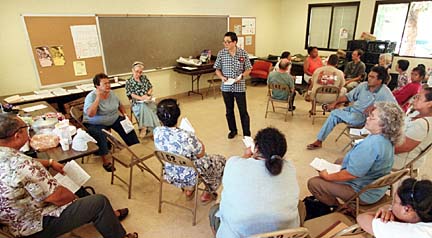Advertisement - Click to support our sponsors.


Island Tenants Members of Island Tenants on the Rise, a group representing residents of public housing projects, have blasted state housing officials after again being denied recognition as a resident advisory board speaking for tenants statewide.
blast state housing
officials
Though the state recognized
the group to qualify for funds,
it no longer does, members sayBy Ian Lind
Star-BulletinAbout two dozen members and supporters of Island Tenants learned of the state's decision during the group's monthly meeting Saturday at Kalakaua Homes' community center.
"They (the state) use our association when they need us to qualify for federal money, but after that we're not recognized, we're nobody. It's like they speak with a forked tongue," said Monique Ocampo, Island Tenants vice president and a resident of Nanakuli Homes.
Ocampo and others said the state was acting arbitrarily and in bad faith by ignoring prior agreements made during discussions that have dragged on for more than two years.
The group has been seeking state recognition since 1998 and received a boost in July when representatives of resident associations from 22 housing projects were convened by the state and voted overwhelmingly to have Island Tenants serve as the advisory group.
But the state's top housing official spelled out her position in a Sept. 1 letter to the Affordable Housing and Homeless Alliance, a copy of which was circulated at Saturday's meeting.
"The Housing and Community Development Corporation of Hawaii (HCDCH) has not recognized the Island Tenants on the Rise as the 'official' Resident Advisory Board (RAB)," Sharyn Miyashiro wrote.
"According to the federal regulations, the RAB must consist of individuals who adequately reflect and represent the residents who are directly assisted by HCDCH under he federal public housing and Section 8 tenant-based programs. The Island Tenants on the Rise does not meet this criterion."
This appears to reverse a previous decision by the housing agency's board of directors, which voted in October 1999 to recognize Island Tenants as an "interim" resident advisory board. The state was under pressure at the time to show resident participation in development of annual and five-year housing plans as required by the U.S. Department of Housing and Urban Development.
Without resident participation in the planning process, the state could have been declared ineligible for millions of dollars in federal housing aid disbursed by HUD.
The state did not object to Island Tenants serving as an official advisory group until after it had used the group's involvement to certify that requirements for resident participation had been met, the group says.
"If Island Tenants is not the resident advisory group, then you (the state) cannot use our name on the plan and HUD should reject it," said Nanakuli Homes resident Michael Rohrer.
Miyashiro's letter did not identify specific reasons for rejecting Island Tenants, although she has previously questioned whether election procedures relied on by the group met all federal requirements.
But Craig Castellanet, a Legal Aid attorney who has been assisting the group, said the state has supervised or facilitated resident association elections in individual housing projects and shares the responsibility to demonstrate they comply with federal guidelines.
Island Tenants is made up of elected leaders of resident associations along with supporters, including residents and nonprofit housing advocates.
The group also approved plans to use a recently announced $10,000 grant from the New York-based Funding Exchange for a six-month organizing effort in public housing projects on the neighbor islands, including door-to-door canvassing of residents.
Some initially questioned the neighbor island focus because the largest number of public housing projects is on Oahu.
Leaders of a few housing projects split from the group last year because they disagreed with the priority given to tenant organizing. Becky Hendricks, resident leader at Hale Poai, said they wanted to focus instead on resolving immediate grievances and problems of residents.